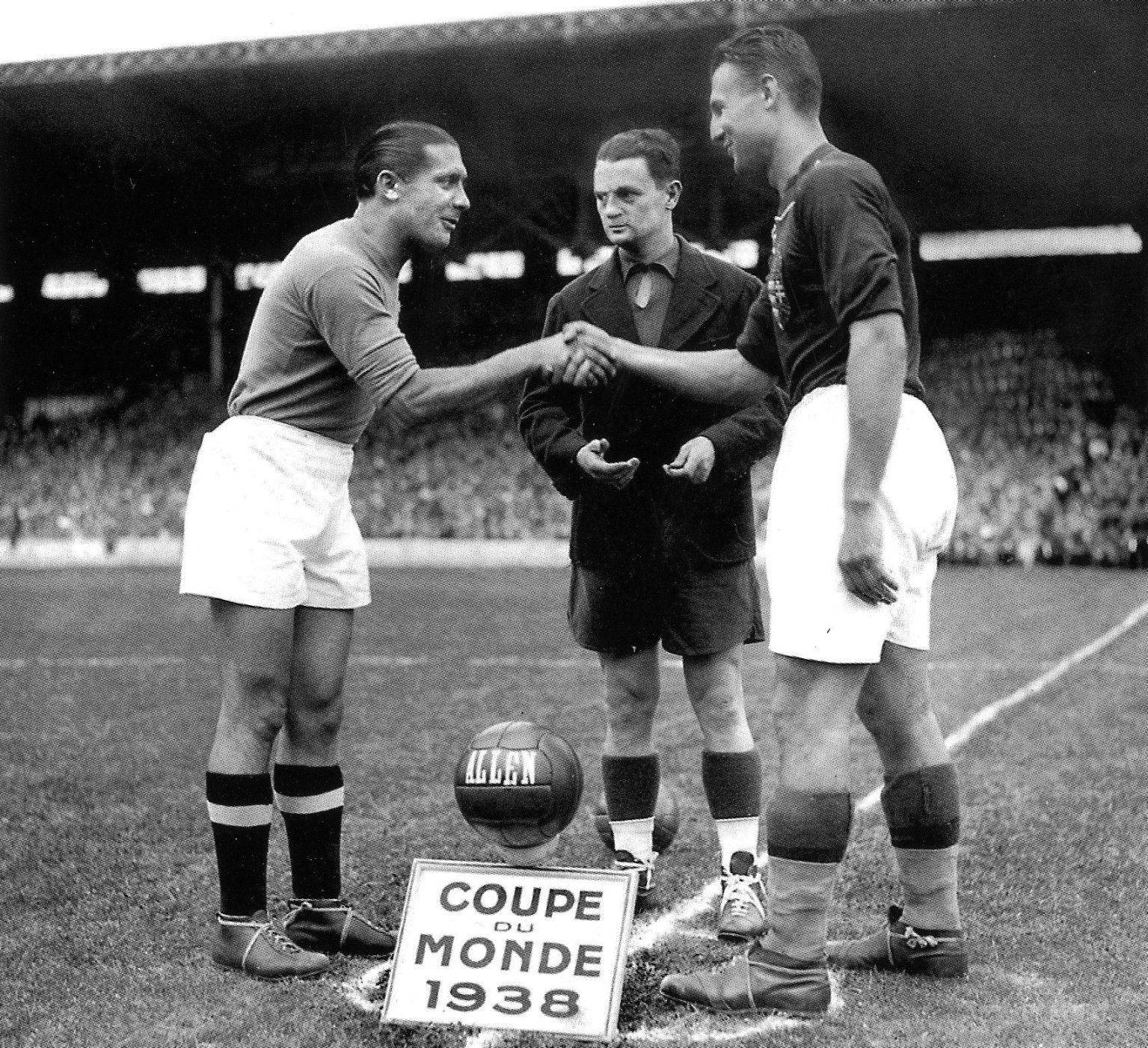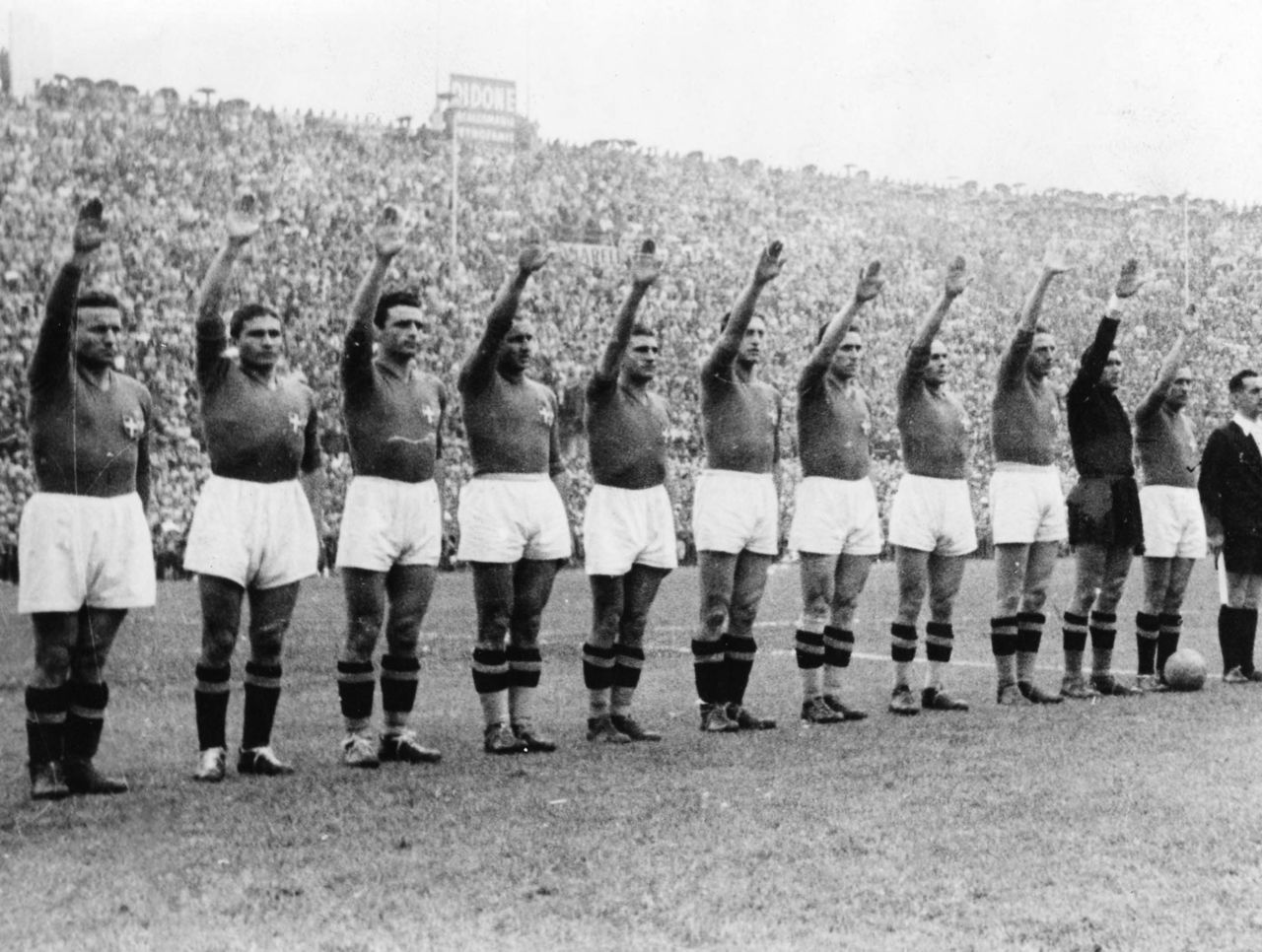What happened at the 1938 World Cup?
In the weeks leading up to the 2014 World Cup in Brazil, we'll set the scene for the next version of the greatest sporting event in the world by reliving each of its predecessors. We continue the build up today, with the last World Cup before World War II.
Who: 15 squads from Asia (1), Europe (12), North America (1) and South America (1).
What: The third World Cup, and the second to be held in Europe.
Why: Because football and European bias.
When: June 4, 1938 to June 19, 1938.
Where: Ten cities across France.
The Final: Italy 4 - Hungary 2

Two years before Italy would declare war on France, and attempt an ill-advised, small-scale invasion, relations between the two nations weren’t that much more congenial. Throughout the tournament, the Italians faced unwelcoming crowds in France. After the French lost to the Azzurri in the quarter finals, the host nation’s favorite squad became whoever competed against Italy.
For the final at the Stade Olympique de Colombes in Paris, the French threw their support behind Hungary. However, even politics wouldn’t stand in the way of appreciating impressive football.
After Hungary equalized eight minutes into the match, the Italians — led by center-forward Silvio Piola, who scored two goals in the final — put on such a wondrous display of skill to close out the first half that even the antagonized French had to applaud a 3-1 Italian lead at the break. Hungary never got back into it, and the Italians retained their 1934 title, by a final score of 4-2.
How Did It Happen?
Argentina, Germany and France all made bids to host the finals. Argentina represented a travel nightmare to the European-biased members of FIFA, and Germany, as evidenced by the 1936 Olympics, would be too political. France, on the other hand, was the homeland of Jules Rimet, the man who created the World Cup. Toss in some modern stadiums already located across the country, and France was the obvious choice.
Guess Who Didn’t Like This Arrangement
The decision to host the tournament in France didn’t make FIFA’s South American contingent very happy. Argentina had assumed it would be awarded the tournament based on the belief that hosting the competition would alternate between South America and Europe. When FIFA popped that balloon, both Argentina and Uruguay refused to make the trip.
Golden Boot
Leônidas - Brazil (7 goals).
Best Nickname
Again, Brazil’s Leônidas. His Portuguese nickname translates to “The Black Diamond.”
Major Innovations
More qualifying (37 sides in total attempted to qualify);
Automatic entry for the hosts and previous winners;
The first glimpse of Brazilian dominance after they won third place;
Brazil and Sweden played each other for the first time. They would go on to meet six more times in the World Cup, a record;
Ernst Loertscher of Switzerland became the first player to be credited with an own goal, playing against Germany in the first round; and
Numbered jerseys.
Substitutes?
Nope. Not yet. An injury still meant your side was down a man.
Group Stage?
Non. A straight knockout tournament meant that a Dutch East Indies (Indonesia) squad would travel all the way to France, only to get trounced 6-0 by Hungary and exit the tournament.
Craziest Match: Switzerland 4 - Germany 2 (First Round Replay)
If the French spectators were less than congenial with the Italian team, they were outright hostile to the Germans. After Germany’s first round match against Switzerland ended in a 1-1 draw, the replay five days later in Paris brought a bottle-throwing mob to the stadium.
The Germans had absorbed Austria’s best players after annexing the nation and forcing their withdrawal from the tournament. While this likely increased the overall talent on the squad, it also brought a lack of cohesion. Despite an early 2-0 lead, the contentious atmosphere didn’t do the divisive team any favors, as Switzerland scored four unanswered goals to win 4-2.
What the mismatched German squad lacked in homogeneity, it more than made up for in ready made excuses. German coach Sepp Herberger blamed the result on the defeatist attitude of five Austrian players he had been forced to include in the squad.
The Headscratcher
After winning their quarterfinal replay against Czechoslovakia, Brazil decided to rest both Leônidas (the eventual Golden Boot winner) and fellow striker Tim against the defending champions from Italy. The only goal Brazil could muster was an 87th minute consolation that made the match look closer than it was with a 2-1 final score.
Leônidas returned for the third-place match against Sweden, in which he scored twice. Too little, too late. But at least he was well-rested for that third place match.
Best Villains

On Benito Mussolini's orders, the Italian team took the pitch for their quarterfinal match against France dressed in black shirts (they were supposed to be wearing white), a symbol of the Italian fascist paramilitary. They proceeded to give the fascist salute before kick-off.
As can be easily imagined, the crowd in Paris wasn’t pleased.
The Forgotten Story
According to legend, Mussolini, prior to the final, sent a telegram to the Italian team with the simple instruction: "Win or Die."
That’s the literal translation to English. In reality, the Italian phrase was more of a call to arms. However, when asked about it, Italian players insisted they never got such a message, and there is nothing about it in any foreign archives.
Nonetheless, Hungarian goalkeeper Antal Szabo — after losing the final against Italy — was reported to have said: "I may have let in four goals, but at least I saved their lives."
Good Job, Good Effort!
Polish forward Ernest Wilimowski scored four goals in his team’s first round loss to Brazil. It still stands as the most goals scored during a losing effort in a World Cup match.
Age Is Only A Number
At 33 years and 159 days old, Sweden’s Tore Keller became the oldest player to ever record a hat trick when he scored three goals against Cuba in the quarterfinals. His record still holds to this day.
Craziest Goal
Italian captain Giuseppe Meazza had his shorts fall down after scoring the match-winning goal on a penalty in the semifinal against Brazil. He took the kick with one hand holding them up, but let go to celebrate.
Best Fans
The French. It’s easy for a host nation to sell out matches involving its own national team, but France set attendance records in matches that had nothing to do with the French team.
Certainly, this was partly spurred on by hatred for the German and Italian national squads, but the French people took to cheering on good football even when it came from political enemies.
The United States?
Nope. Brazil and Cuba were the only countries from the Americas to make the trek to France. Neither side even had to qualify, as no other nations on their side of the world were interested in traveling to compete.
The One And Only
Italy’s infamous manager Vittorio Pozzo is the only coach to win two World Cup championships. Most impressively, he did so with two vastly different squads utilizing varying tactics and diverse formations. Unfortunately, his legacy was tarnished due to his close association with Mussolini's Fascist Italy.
Legacy
Because of World War II, the World Cup would not be held for another 12 years. If you want to be technical, Italy were the reigning World Cup holders for a record 16 years, from 1934 to 1950.
That might not seemed deserved since they only had to win two tournaments in that time frame. However, we can give them some credit for hanging on to the trophy. After all, Italian Vice-President of FIFA, Dr. Ottorino Barassi, hid the trophy in a shoe-box under his bed throughout the conflict, ensuring that it wouldn’t be lost to scavengers or fall into the hands of occupying troops.
HEADLINES
- Giannis responds to LeBron praise: 'I don't like comparing eras'
- Devers confident 'everything will change' amid rough start
- Hellebuyck has NHL-best 7th shutout as Jets blank Devils
- Warriors top Pelicans as Curry scores 23 in return from injury
- Anunoby leads way as Knicks complete regular-season sweep of Bucks